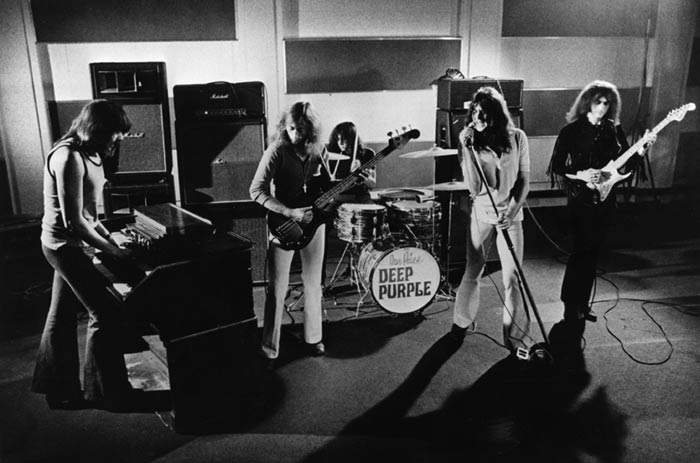Deep Purple |
 |
Ritchie Blackmore, guitar
b. 14 April 1945 in Weston-super-Mare |
Rod Evans, singer
b. 19 January 1947 in Slough, Berkshire |
Jon Lord, keyboards
b. Jon Douglas Lord, 9 June 1941 |
Ian Paice, drums
b. Ian Anderson Paice, 29 June 1948 |
Nick Simper, bass
b. Nicholas John Simper, 3 November 1945, Southall, Middlesex |
|
|
| Formed from a band called Roundabout, the idea of ex-Searcher Chris Curtis which businessmen Tony Edwards and John Coletta saw as an investment opportunity. Curtis's erratic behavior forced him off the project, but not before he had recruited guitarist Ritchie Blackmore and keyboard player Jon Lord. |
| Blackmore (who had played previously with Screaming Lord Sutch) and Lord (Flowerpot Men [Ivy League] were the first members of Roundabout. They added Simper (from the Flowerpot Men), adding Evans and Paice after auditions. Blackmore enlisted the assistance of independent producer Derek Lawrence who had worked with Joe Meek and with whom Blackmore had recorded. Lawrence arranges for Parlophone to release the recordings they have made at Pye. |
| Blackmore reportedly renamed the band after his mother's favorite song. The band would begin as a pop band and would eventually evolve into something heavier. |
| |
| 1968 |
| 21 June. "Hush" / "One More Rainy Day" (Parlophone R 5708) |
| July. Shades of Deep Purple (Parlophone PMC/PCS 7055) |
| 6 December. "Kentucky Woman" / "Wring that Neck" (Parlophone R 5745) |
| |
| 1969 |
| 21 February. "Emmaretta" / "Wring that Neck" (Parlophone R 5763) |
| EMI established Harvest Records as their progressive label and Deep Purple were one of the first bands to release material in this new division of the company. |
| |
|
| The band would undergo almost continual personnel changes, each time adopting a new musical style from a rock band to playing with the Royal Philharmonic Orchestra (Concerto for Group and Orchestra). |
| |
| Deep Purple's official website |
